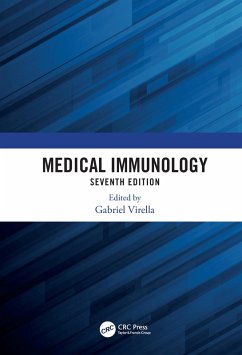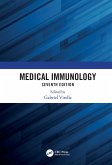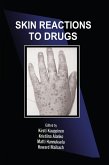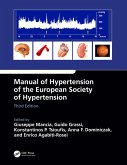Medical Immunology, 7th Edition (eBook, PDF)
Redaktion: Virella, Gabriel
78,95 €
78,95 €
inkl. MwSt.
Sofort per Download lieferbar

39 °P sammeln
78,95 €
Als Download kaufen

78,95 €
inkl. MwSt.
Sofort per Download lieferbar

39 °P sammeln
Jetzt verschenken
Alle Infos zum eBook verschenken
78,95 €
inkl. MwSt.
Sofort per Download lieferbar
Alle Infos zum eBook verschenken

39 °P sammeln
Medical Immunology, 7th Edition (eBook, PDF)
Redaktion: Virella, Gabriel
- Format: PDF
- Merkliste
- Auf die Merkliste
- Bewerten Bewerten
- Teilen
- Produkt teilen
- Produkterinnerung
- Produkterinnerung

Bitte loggen Sie sich zunächst in Ihr Kundenkonto ein oder registrieren Sie sich bei
bücher.de, um das eBook-Abo tolino select nutzen zu können.
Hier können Sie sich einloggen
Hier können Sie sich einloggen
Sie sind bereits eingeloggt. Klicken Sie auf 2. tolino select Abo, um fortzufahren.

Bitte loggen Sie sich zunächst in Ihr Kundenkonto ein oder registrieren Sie sich bei bücher.de, um das eBook-Abo tolino select nutzen zu können.
This new edition of Medical Immunology provides a brief clinical review of human response to infection. Emphasizing on clinical applications, methodological advances, immunological diseases,and innovative interventions, this guide navigates readers through technologies and demonstrates their implementation in daily clinical practice of immunology.
- Geräte: PC
- ohne Kopierschutz
- eBook Hilfe
- Größe: 15.93MB
Andere Kunden interessierten sich auch für
![Factor VIII - von WIllebrand Factor, Volume I (eBook, PDF) Factor VIII - von WIllebrand Factor, Volume I (eBook, PDF)]() M. J. SeghatchianFactor VIII - von WIllebrand Factor, Volume I (eBook, PDF)51,95 €
M. J. SeghatchianFactor VIII - von WIllebrand Factor, Volume I (eBook, PDF)51,95 €![Medical Immunology, 7th Edition (eBook, ePUB) Medical Immunology, 7th Edition (eBook, ePUB)]() Medical Immunology, 7th Edition (eBook, ePUB)77,95 €
Medical Immunology, 7th Edition (eBook, ePUB)77,95 €![Human Factors and Patient Safety (eBook, PDF) Human Factors and Patient Safety (eBook, PDF)]() Ibrahim ImamHuman Factors and Patient Safety (eBook, PDF)28,95 €
Ibrahim ImamHuman Factors and Patient Safety (eBook, PDF)28,95 €![Skin Reactions to Drugs (eBook, PDF) Skin Reactions to Drugs (eBook, PDF)]() Skin Reactions to Drugs (eBook, PDF)205,95 €
Skin Reactions to Drugs (eBook, PDF)205,95 €![Manual of Hypertension of the European Society of Hypertension, Third Edition (eBook, PDF) Manual of Hypertension of the European Society of Hypertension, Third Edition (eBook, PDF)]() Manual of Hypertension of the European Society of Hypertension, Third Edition (eBook, PDF)103,95 €
Manual of Hypertension of the European Society of Hypertension, Third Edition (eBook, PDF)103,95 €![Handbook of Nutritional Disorders (eBook, PDF) Handbook of Nutritional Disorders (eBook, PDF)]() Jahangir MoiniHandbook of Nutritional Disorders (eBook, PDF)62,95 €
Jahangir MoiniHandbook of Nutritional Disorders (eBook, PDF)62,95 €![The Art of Breaking Bad News Well (eBook, PDF) The Art of Breaking Bad News Well (eBook, PDF)]() Jalid SehouliThe Art of Breaking Bad News Well (eBook, PDF)36,95 €
Jalid SehouliThe Art of Breaking Bad News Well (eBook, PDF)36,95 €-
-
-
This new edition of Medical Immunology provides a brief clinical review of human response to infection. Emphasizing on clinical applications, methodological advances, immunological diseases,and innovative interventions, this guide navigates readers through technologies and demonstrates their implementation in daily clinical practice of immunology.
Dieser Download kann aus rechtlichen Gründen nur mit Rechnungsadresse in A, B, BG, CY, CZ, D, DK, EW, E, FIN, F, GR, HR, H, IRL, I, LT, L, LR, M, NL, PL, P, R, S, SLO, SK ausgeliefert werden.
Produktdetails
- Produktdetails
- Verlag: Taylor & Francis
- Seitenzahl: 478
- Erscheinungstermin: 8. Oktober 2019
- Englisch
- ISBN-13: 9781000537130
- Artikelnr.: 57871998
- Verlag: Taylor & Francis
- Seitenzahl: 478
- Erscheinungstermin: 8. Oktober 2019
- Englisch
- ISBN-13: 9781000537130
- Artikelnr.: 57871998
- Herstellerkennzeichnung Die Herstellerinformationen sind derzeit nicht verfügbar.
Gabriel Virella obtained his MD and PhD degrees at the University of Lisbon, Portugal, in 1967 and 1974. He did post-doctoral studies in Immunology at the Department of Experimental Pathology, University of Birmingham, England (1968-69) and at the National Institute for Medical Research, Mill Hill, London, England (1969-1970). From 1970 to 1975 was a Researcher at the Gulbenkian Institute of Science, Oeiras, Portugal. He moved to the Medical University of South Carolina (MUSC) in 1975, where he is an Emeritus Professor of Immunology and Microbiology. He has published 260 articles in topics related primarily to immunology, with particular emphasis on the involvement of autoimmune phenomena in the pathogenesis of atherosclerosis. He has described original techniques for the isolation and characterization of antigen-antibody complexes, immunoassays for tetanus and diphtheria antibodies, and for the assay of modified LDL and corresponding antibodies. In 1989 he was co-recipient with Drs. Christoph Gisinger and Maria F. Lopes Virella of the Squibb Award of the Austrian Society for Internal Medicine for the work entitled "Metabolic effects of Lipoprotein Immune Complexes in Macrophages". He co-edited a first edition of "Introduction to Medical Immunology" in 1986, and became the single editor of the 3rd edition, in 1993. The 4 ed. (1999) was translated to the Italian. He has now edited the 7th Ed. of Medical Immunology. In addition, he published "NMS Microbiology and Infectious Diseases", 3rd Ed, Williams&Wilkins, 1997; and NMS Q&A Microbiology, Immunology, and Infectious Diseases, Lippincott Williams & Wilkins, 1999. He was Section Editor of Clinical Immunology from 1989 to 2003. During his tenure at the Medical University of South Carolina he received numerous teaching awards from the students, the Health Science Foundation Teaching Excellence Award, MUSC in 1996 and 2006, Governor's Distinguished Professor Award in 1996 and 2006, the National Robert J. Glaser Distinguished Teacher Award in 2003, and cited as Cited as "Master Teacher" by the Board of Trustees of The Medical University of S.C. in 2007.
Introduction. Leukocytes and lymphoid tissues: The framework of the immune
system. Major histocompatibility complex. Adaptive immune response:
Antigens, lymphocytes, and accessory cells. Immunoglobulins: Structure and
diversity. Immunoglobulins: Metabolism and biological properties. Genetics
of immunoglobulins: Ontogenic, biological, and clinical implications.
Antigen-antibody reactions. The complement system in health and disease.
Monocyte and lymphocyte membrane markers: Ontogeny and clinical
significance. Cell-mediated immunity. Adaptive humoral immunity and
immunoprophylaxis. Phagocytic cells and their functions. Anti-infectious
innate and adaptive immune responses. Diagnostic applications of
immunology. Tolerance and autoimmunity. Organ-specific autoimmune diseases.
Systemic lupus erythematosus. Rheumatoid arthritis. Overview of
hypersensitivity. IgE-mediated (immediate) hypersensitivity.
Immunohematology. Pathogenic role of antigen-antibody complexes. Immune
system modulators. Transplantation immunology. Tumor immunology. Lymphocyte
and plasma cell malignancies. Diagnosis of immune deficiency diseases.
Primary immunodeficiency diseases. AIDS and other acquired
immunodeficiencies
system. Major histocompatibility complex. Adaptive immune response:
Antigens, lymphocytes, and accessory cells. Immunoglobulins: Structure and
diversity. Immunoglobulins: Metabolism and biological properties. Genetics
of immunoglobulins: Ontogenic, biological, and clinical implications.
Antigen-antibody reactions. The complement system in health and disease.
Monocyte and lymphocyte membrane markers: Ontogeny and clinical
significance. Cell-mediated immunity. Adaptive humoral immunity and
immunoprophylaxis. Phagocytic cells and their functions. Anti-infectious
innate and adaptive immune responses. Diagnostic applications of
immunology. Tolerance and autoimmunity. Organ-specific autoimmune diseases.
Systemic lupus erythematosus. Rheumatoid arthritis. Overview of
hypersensitivity. IgE-mediated (immediate) hypersensitivity.
Immunohematology. Pathogenic role of antigen-antibody complexes. Immune
system modulators. Transplantation immunology. Tumor immunology. Lymphocyte
and plasma cell malignancies. Diagnosis of immune deficiency diseases.
Primary immunodeficiency diseases. AIDS and other acquired
immunodeficiencies
Introduction. Leukocytes and lymphoid tissues: The framework of the immune
system. Major histocompatibility complex. Adaptive immune response:
Antigens, lymphocytes, and accessory cells. Immunoglobulins: Structure and
diversity. Immunoglobulins: Metabolism and biological properties. Genetics
of immunoglobulins: Ontogenic, biological, and clinical implications.
Antigen-antibody reactions. The complement system in health and disease.
Monocyte and lymphocyte membrane markers: Ontogeny and clinical
significance. Cell-mediated immunity. Adaptive humoral immunity and
immunoprophylaxis. Phagocytic cells and their functions. Anti-infectious
innate and adaptive immune responses. Diagnostic applications of
immunology. Tolerance and autoimmunity. Organ-specific autoimmune diseases.
Systemic lupus erythematosus. Rheumatoid arthritis. Overview of
hypersensitivity. IgE-mediated (immediate) hypersensitivity.
Immunohematology. Pathogenic role of antigen-antibody complexes. Immune
system modulators. Transplantation immunology. Tumor immunology. Lymphocyte
and plasma cell malignancies. Diagnosis of immune deficiency diseases.
Primary immunodeficiency diseases. AIDS and other acquired
immunodeficiencies
system. Major histocompatibility complex. Adaptive immune response:
Antigens, lymphocytes, and accessory cells. Immunoglobulins: Structure and
diversity. Immunoglobulins: Metabolism and biological properties. Genetics
of immunoglobulins: Ontogenic, biological, and clinical implications.
Antigen-antibody reactions. The complement system in health and disease.
Monocyte and lymphocyte membrane markers: Ontogeny and clinical
significance. Cell-mediated immunity. Adaptive humoral immunity and
immunoprophylaxis. Phagocytic cells and their functions. Anti-infectious
innate and adaptive immune responses. Diagnostic applications of
immunology. Tolerance and autoimmunity. Organ-specific autoimmune diseases.
Systemic lupus erythematosus. Rheumatoid arthritis. Overview of
hypersensitivity. IgE-mediated (immediate) hypersensitivity.
Immunohematology. Pathogenic role of antigen-antibody complexes. Immune
system modulators. Transplantation immunology. Tumor immunology. Lymphocyte
and plasma cell malignancies. Diagnosis of immune deficiency diseases.
Primary immunodeficiency diseases. AIDS and other acquired
immunodeficiencies







